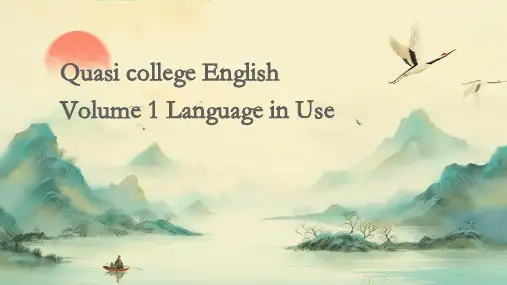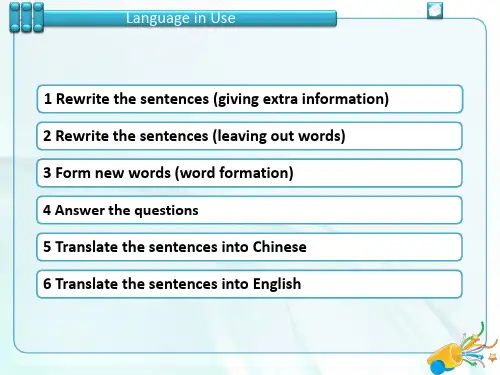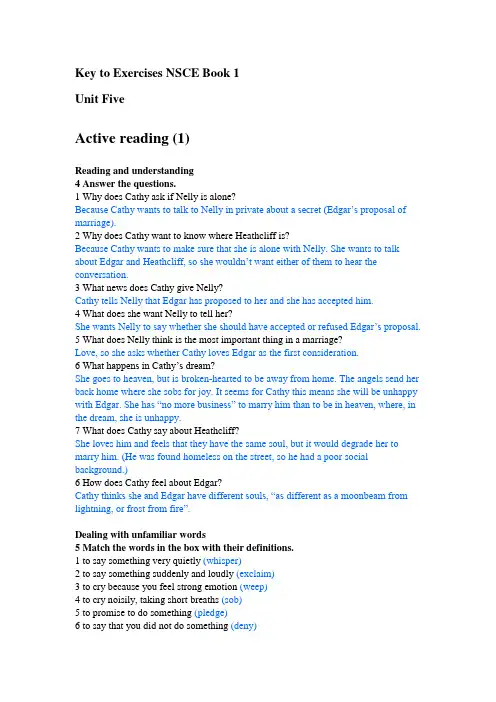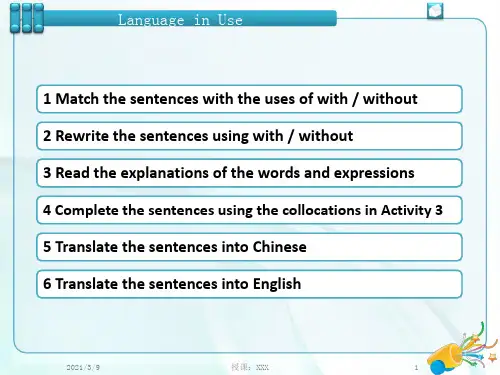新目标大学英语1u5LanguageinUse-精品文档
- 格式:pptx
- 大小:1.84 MB
- 文档页数:33



![[实用参考]新标准大学英语综合教程Language-in-use](https://uimg.taocdn.com/2e5d5bea9ec3d5bbfd0a7480.webp)


Key to Exercises NSCE Book 1Unit FiveActive reading (1)Reading and understanding4 Answer the questions.1 Why does Cathy ask if Nelly is alone?Because Cathy wants to talk to Nelly in private about a secret (Edgar’s proposal of marriage).2 Why does Cathy want to know where Heathcliff is?Because Cathy wants to make sure that she is alone with Nelly. She wants to talk about Edgar and Heathcliff, so she wouldn’t want either of them to hear the conversation.3 What news does Cathy give Nelly?Cathy tells Nelly that Edgar has proposed to her and she has accepted him.4 What does she want Nelly to tell her?She wants Nelly to say whether she should have accepted or refused Edgar’s proposal.5 What does Nelly think is the most important thing in a marriage?Love, so she asks whether Cathy loves Edgar as the first consideration.6 What happens in Cathy’s dream?She goes to heaven, but is broken-hearted to be away from home. The angels send her back home where she sobs for joy. It seems for Cathy this means she will be unhappy with Edgar. She has “no more business” to marry him than to be in heaven, where, in the dream, she is unhappy.7 What does Cathy say about Heathcliff?She loves him and feels that they have the same soul, but it would degrade her to marry him. (He was found homeless on the street, so he had a poor social background.)6 How does Cathy feel about Edgar?Cathy thinks she and Edgar have different souls, “as different as a moonbeam from lightning, or frost from fire”.Dealing with unfamiliar words5 Match the words in the box with their definitions.1 to say something very quietly (whisper)2 to say something suddenly and loudly (exclaim)3 to cry because you feel strong emotion (weep)4 to cry noisily, taking short breaths (sob)5 to promise to do something (pledge)6 to say that you did not do something (deny)7 to stop someone from doing something, like speaking (interrupt)8 to start something again, like speaking (resume)9 to breathe out slowly, especially because you are sad (sigh)10 to say the opposite of what someone has said is true (contradict)Now check (¸) the reporting verbs which give most information about emotions. exclaim, weep, sob, pledge, sigh, contradict6 Replace the underlined words with the correct form of the words in the box.1 He was resting with his knees on the ground beside her when he asked her to marry him. (kneeling)2 It was traditional to ask for the father’s permission to marry the daughter. (consent)3 Her feelings towards him became different as she got to know him better. (altered)4 He continued with his argument, even though she didn’t agree with him. (pursued)5 Her refusal to admit what had happened made him get angry. (denial)6 He came home in a terrible mood and threw his bag onto the floor. (temper; flung)7 Answer the questions about the words and expressions.1 When you rock a baby, do you move it backwards and forwards (a) gently, or (b) violently?2 If you are having a doze, are you (a) asleep, or (b) working?3 If someone’s behaviour is shameful, should they (a) be proud of what they have done, or (b) feel very sorry about what they have done?4 If you aren’t worried about anything, save your own concerns, does this mean (a) you don’t have to be worried, or (b) you’re only worried about your own business?5 If you do something sulkily, will people notice that you are in (a) a good mood, or (b)a bad mood?6 Is a look which turns off someone’s bad temper likely to be (a) gentle, or (b) angry?7 If you come to the point, do you (a) come to the end of something, or (b) say what is important?8 If something is no business of yours, should you (a) be interested in it, or (b) not be interested in it?9 If something degrades someone, does it make people respect them (a) less, or (b) more?10 Does “What good is it doing something?” mean (a) “Why do it?”, or (b) “Is it a good thing to do?”Active reading (2)Dealing with unfamiliar words4 Match the words in the box with their definitions.1 a strong feeling of sadness (grief)2 a round shape or curve (loop)3 an image that you see when you look in a mirror (reflection)4 to let something fall off as part of a natural process (shed)5 a smooth and beautiful way of moving (grace)6 attractive (cute)7 continuing to support someone or be their friend (faithful)8 to cover something by putting something such as paper or cloth around it (wrap)9 not bright (dim)5 Complete the sentences with the correct form of the words in Activity 4.1 I’ve been faithful to my husband all my life.2 I’d like to give this as a present. Could you wrap it for me in silver paper, please?3 The public expression of grief after the death of the princess lasted for several days.4 She dances with such grace! I think she could become a professional dancer.5 I can’t see very well in here. The light’s rather dim.6 When I saw my reflection in the mirror this morning I got a shock.6 Answer the questions about the words.1 Does a bill refer to (a) a bird’s mouth, or (b) a request for money in the poem?2 Is satin (a) a soft delicate material, or (b) a hard rough material?3 If something is wobbling, is it (a) not moving, or (b) moving unsteadily?4 Does platinum refer to (a) a colour like silver, or (b) a colour like gold?5 Is something that is lethal (a) very friendly, or (b) extremely dangerous?6 If a cloth has been embroidered, is it likely to be (a) multi-coloured, or (b) uncoloured?Language in Usewhatever, whoever etc1 Rewrite the sentences with the word in brackets.1 I don’t know who wrote this poem, but he was very romantic. (whoever) Whoever wrote this poem was very romantic.2 Heathcliff may be anywhere, but he isn’t in the house. (wherever)Wherever Heathcliff may be, he isn’t in the house.3 I don’t know what to say, because she doesn’t listen to me any more. (whatever) Whatever I say, she doesn’t listen to me anymore.4 Every time I told him a secret, he told his friends. (whenever)Whenever I told him a secret, he told his friends.5 Anything may happen, but I will always be faithful. (whatever)Whatever happens, I will always be faithful.6 I don’t know who sent me this parcel, but they know I like chocolates. (whoever) Whoever sent me this parcel knows I like chocolates.7 I’m not exactly sure what I’m eating, but it’s very nice. (whatever)Whatever I’m eating, it’s ve ry nice.8 You may end up anywhere in the world, but I will never forget you. (wherever)Wherever you end up in the world, I will never forget you.present participles2 Rewrite the sentences.1 Since I felt concerned, I asked her to phone me the next day.I, feeling concerned, asked her to phone me the next day.2 When Judith fell asleep she was clinging to her teddy bear.Judith fell asleep, clinging to her teddy bear.3 Sarah dried her eyes and tried to smile.Sarah, drying her eyes, tried to smile.4 H e took out the card and said, “This valentine’s for me.”“This valentine’s for me,” he said, taking out the card.5 I was waiting for the train when I read that poem.I waited for the train, reading that poem.6 Since I didn’t have much money with me, I couldn’t pay for the meal.I, not having much money with me, couldn’t pay for the meal.no more … than3 Look at the sentence and answer the question.I’ve no more business to marry Edgar Linton than I have to be in heaven.Cathy means that (c) .(a) if she marries Edgar Linton she will feel as if she’s in heaven(b) she won’t go to heaven if she married Edgar Linton(c) she doesn’t want to marry Edgar Linton and doesn’t feel she should be in heaven4 Rewrite the sentences using no more … than .1 I have no reason to get married, and I’ve got no reason to change my job.I have no more reason to get married than (I have) to change my job.2 She’s got no reason to feel unhappy, and no reason to celebrate.She’s got no more reason to feel unhappy than (she has) to celebrate.3 There’s no point in waiting here, and no point in calling a taxi.There’s no more point in waiting here than (there is) in calling a taxi.4 We have no interest in starting this task, or in finishing the first one.We have no more interest in starting this task than (we have) in finishing the first one.5 I’ve got no business to advise her about her private life, nor should she advise me about mine.I’ve got no more business to advise her about her private life than she has to advise me about mine.6 I have no wish to start a new relationship, or to write another book.I have no more wish to start a new relationship than (I have) to write another book. collocations5 Read the explanation of the words. Answer the questions.1 pursue To pursue means to follow a course of activity.(a) If you pursue the matter, you are likely to try to reach a decision (you don’t abandon it).(b) When you pursue your career, you have the career you want and you want to get ahead in it.(c) If the police are pursuing their inquiries, they haven’t solved the crime, and are still investigating it.2 denial A denial is a statement that something did not happen or isn’t true.(a) If you’re in denial about your age, you don’t admit how old you are.(b) If a company issues a strong denial of responsibility, they don’t admit to having done anything wrong.3 temper If you have a temper, you tend to get angry very quickly.(a) When tempers flare, people get angry.(b) If someone tells you to keep your temper during a discussion, they are likely to be telling you to calm down, and you shouldn’t lose your temper.(c) If people fly into a temper, they lose their temper very quickly and get really angry.4 wrap To wrap something is to cover something in cloth or paper.(a) If you wrap up a meeting, you finish it (because wrapping up a package is the last stage of preparing a gift or buying something).(b) If you’re wrapped up in your work, it interests you very much, and you spend a lot of time doing it or thinking about it, s o you don’t notice anything else.(c) If you keep something under wraps, you keep it secret (as if it is a package wrapped up so other people can’t see what it is).6 Translate the sentences into Chinese.1 Her lips were half asunder as if she meant to speak; and she drew a deep breath, but it escaped in a sigh, instead of a sentence.她半张着嘴,似乎想说什么;她深深地吸了一口气,可随之而来的却是一声无语的叹息。





Liste ning and Speak ing1.Growi ng UpGrow ing up is by no means a bad thi ng. It allows us to make a1) differenee in the world, to find out who we are, and to live the life we 2)imagined as ehildren. Wedreamed of growing up when we rested our young heads on our downy pillows and looked up with 3) wonder at the glow-i n-the-dark stars stuck to our eeili ng, won deri ng what the world4) looked like beyond our own home, beyond the world that had been someticulously created for us. Yet upon growing up, we find that reality ofte n 5)contends with those very dreams. We find that the6) reality of growing up is perhaps less lovely than we' d envisioned. We find thatthe only thing we really want back is our youth and our7) innocence and the cruel irony is that these are the very things thatwill never 8) return .Text ARead ing Comprehe nsioni.A.My momwas said to be a good momuntil one day in my ninth year, she left my two brothers and me forever. What she did puzzled me and cha nged everything in my life, though I never shed a tear . My dad did what he could to keep our life as no rmal as possible, prompti ng us to rema in grateful to God. The revisiting of the memoryof mymomduring my senior year of high school made me un dersta nd that I n eeded to grieve my moso that I could move on to a new chapter of my life. I couldn ' t find anyone to whom to discharge my emotio ns un til I participated in Kathy Rudy' s Baldwin Scholars freshman seminar in Duke, where I learned to let go of my mother and was able to make sense of some of the thi ngs in my life. Notice of the speculati on of my mother' s death left me shock in gly unaffected, for the grief and the pressures imposed upon mylife by mymom were already released. The whole issue taught me that people n eed to deal with the past by understanding it, then leaving it behind , and most importa ntly, ack no wledgi ng pain as an opport un ity for growth.Read ing and Discuss ingLan guage in Use4.4) dischargi ng5) clarity6) con tacted7) compromise8) grieved9) affirmed10) prompted5.1) If you don' t know what you want, you might end up with something you don' t want .2) It is the time of year whenthe island nations of the Caribbean normallyexpect their hotels and beaches to be crammed with sun-seekers3) I can teach you about kindn ess, but I cannot impose gracious nesson/upon you .4) Whe npare nts find it hard to let go of bitterness or an ger, or if they are depressed about the changes brought on by divorce, they can find help from a coun selor or therapist.5) As the preferred can didate for this job he has no shortco ming other than his lack of experie nee6.3) on hand4) at hand5) along the way6) out of the way7) in the way8) on the way to9) By the way10) un der way7.For reference2) A3) A8) C8.1) 在哭闹了5分钟之后,我最终妥协了,心想如果明天妈妈一大早就来接我,那我现在就进去。
(全新版)大学英语《综合教程》第一册Unit5 (Unit 5)In today's fast-paced world, the importance of learning English cannot be overstated. English has become a universal language, connecting people from different cultures and backgrounds. As an integral part of the curriculum, the "Comprehensive Tutorial" series of textbooks aims to provide students with a solid foundation in the English language. In this article, we will explore the key features and benefits of the newest edition of the "Comprehensive Tutorial" series, specifically focusing on Unit 5.Unit 5 of the "Comprehensive Tutorial" series introduces students to the theme of "Education." This unit aims to enhance students' language skills while also providing them with valuable knowledge about the education system and its challenges. The unit comprises various sections, each targeting different language aspects and addressing specific educational topics.One of the highlights of Unit 5 is its focus on vocabulary expansion. The unit includes a wide range of academic and educational vocabulary words that students can incorporate into their everyday language use. From "curriculum" to "plagiarism," students will gain a comprehensive understanding of essential terms related to education. Numerous exercises and activities within the unit make it possible for students to actively engage with the new vocabulary and reinforce their learning through practice.Furthermore, Unit 5 also emphasizes writing skills. It includes a section dedicated to academic writing, guiding students through the process ofconstructing well-structured essays. The unit introduces students to various types of essays commonly encountered in an academic setting, such as argumentative essays and descriptive essays, providing them with a step-by-step approach to master each style. By following the provided guidelines and practicing the given exercises, students can enhance their writing abilities and prepare themselves for future academic challenges.In addition to vocabulary expansion and writing skills, Unit 5 also focuses on developing students' listening and speaking skills. Through a variety of authentic recordings and interviews, students are exposed to real-life situations related to education. They have the opportunity to listen to different accents and improve their listening comprehension skills. The unit also incorporates interactive speaking activities, enabling students to engage in discussions and express their opinions on a range of educational topics. These activities foster a collaborative learning environment, encouraging students to actively participate and communicate in English.Another unique component of Unit 5 is its incorporation of cultural insights. The unit explores the significance of education in different cultures around the world, shedding light on educational practices, beliefs, and traditions from diverse perspectives. By understanding the cultural nuances associated with education, students develop a global mindset and become more open-minded individuals.To enhance self-assessment and independent learning, Unit 5 includes regular self-evaluation exercises and a comprehensive review section at the end of the unit. These features allow students to gauge their progress,identify areas of improvement, and reinforce their understanding of the unit's content.In conclusion, Unit 5 of the "Comprehensive Tutorial" series offers a comprehensive and engaging approach to learning English in the context of education. Through its focus on vocabulary expansion, writing skills, listening and speaking abilities, cultural insights, and self-assessment, the unit equips students with the necessary tools to excel in their language learning journey. The newest edition of the textbook serves as a valuable resource for both teachers and students, providing a solid foundation for developing a strong command of the English language.。
大学英语1课程教案Unit 1 Starting OutTeaching Content:Diary of AFresherLesson Type: Intensive Reading (New StandardCollege English Book 1)Total Time:4。
5 HoursClass/Object:Freshman (the first term)Teaching Procedures:Step 1Starting Point(15mins)1. What do you expect to learn in the university?2。
Work in pairs。
Look at the photo of a university. Choose words to describe it。
And then think of words to describe your own college.3. Work in pairs。
Brainstorm college education objectives and what are important to you.☐finding a girlfriend / boyfriend☐studying hard and learning a lot☐meeting people and making friends☐getting a good job when you graduate☐having fun☐growing up and becoming independent☐going to parties☐doing lots of sport☐reading widely☐learning new skills and having new experiencesStep 2Introductory remarks(10mins)How to write a diary in English1. Format:a. Write down the date, the day and the weather on the first line. The date and the day areon the left,while the weather is on the right.b。
M1unit 5 Language Around the WorldUsing LanguageMotto: One language sets you in corridor for life. Two languages open every door along the way.一种语言可以为人生开启一条走廊。
两种语言则会使这条人生走廊的沿途上处处开启大门。
I. Learning aims:1. Master the important information of listening materials.2. Improve listening skills.II. Self- learning guidance and testIII.ConsolidationLevel A. Work in pairs. Discuss which other language(s) you want to learn.Example.A: What language do you want to study.B: I really want to study French. I think that the French language sounds beautiful.A: Why? Do you want to go to France some day?B: Yes, I’d love to. Also, French is used by many international organizations around the world. Do you know that FIFA’s full name is in French.A: Oh, I remember that. But I don’t know how to pronounce it._____________________________________________________________________________________________________ _____________________________________________________________________________________________________ _____________________________________________________________________________________________________ _____________________________________________________________________________________________________ __________________________________________________________________________________________________________________________________________________________________________________________________________ Level B. Translation.1.不管发生什么事,我都会支持你。
M1 Unit 5 Languages around the worldUsing languageMotto: One language sets you in a corridor for life. Two languages open ever y door along the way.一种语言可以为你开启一条走廊。
两种语言则会使这条人生走廊的沿途上处处开启大门。
I. Learning aims1. To learn how to get the basic facts by listening and infer some conclusions based on the listening materials.2. To talk about the related topics mentioned in the listening parts.II. Self-learning guidance and testsIII. ConsolidationLevel A: Fill in the blanks.1. While travelling, you’d better communicate with the ________ (native) as much as possible.2. People throughout the world spend ________ (billion) of dollars a year on weight loss pills.3. Believe it or not, your attitude ________ money is more important than how much you are.4. You’d better write down the phone number of that restaurant for future ________ (refer).5. They speak neither French ________ German, but a strange mixture of the two.Level B: 语法填空。